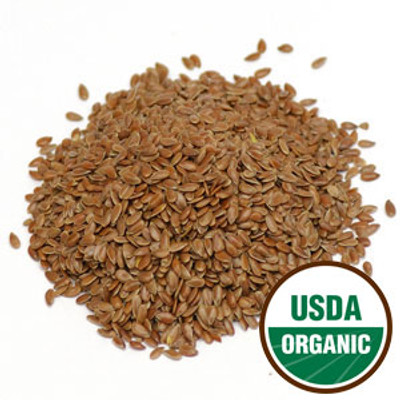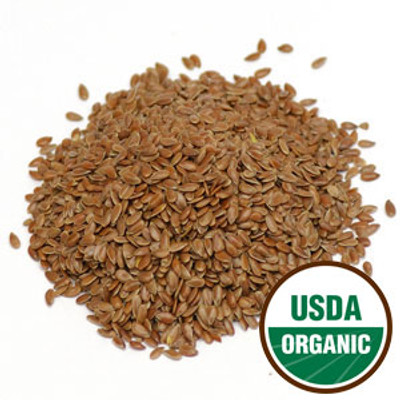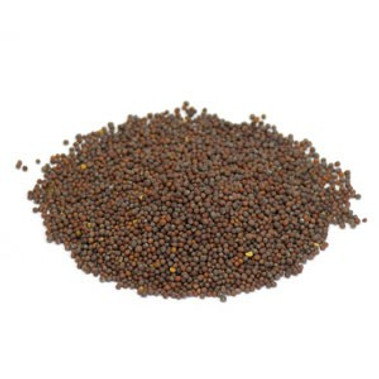Brown Flax Seeds
Scientific Name:
Linum usitatissimum
Common Names:
Flax, Flaxseed, Lint Bells, Winterlien, Linseed, Linum; Spanish: Linaza, Linasa, Lino. [1]
Description of Brown Flax Seed:
Flax, Linum usitatissimum, is an upright annual plant growing to 1.2 m (3 ft 11 in) tall, with slender stems. The leaves are glaucous green, slender lanceolate, 20–40 mm long and 3 mm broad.
The flowers are pure pale blue, 15–25 mm diameter, with five petals; they can also be bright red. The fruit is a round, dry capsule 5–9 mm diameter, containing several glossy brown seeds shaped like an apple pip, 4–7 mm long. [2]
History of Brown Flax Seed:
Flax has been cultivated for more than 7,000 years in the Middle East as a source of linen fiber and for its oil.
The ancient Egyptians, Hebrews, Greeks, and Romans used the seeds as food, the oil as medicine, and the fibers for clothing and ships’ sails.
The Roman legion used bread made from flax and were able to march long distances and then do battle. Today, Roman meal bread still uses flaxseed, while the linseed oil is used in the manufacture of varnish, paint, linoleum, and soap.
The medicinal properties were well known to the Greeks as Hippocrates recommended flax for mucous membrane inflammations.
In the 8th century in France, Charlemagne passed laws requiring the seeds to be consumed in order to keep his subjects healthy. [3]
Uses of Brown Flax Seed:
Antiseptic, anti-inflammatory, demulcent, emollient, laxative, purgative, soothing anti-tussive.
The seeds contain both soluble and insoluble fiber which promote intestinal health and lignans, a form of phytoestrogens believed to help protect against colon, prostate, and breast cancers.
Oil from the seeds contains essential fatty acids which are helpful for eczema, menstrual disorders, rheumatoid arthritis, and atherosclerosis.
The seeds have long been used as a bulk laxative and soothing expectorant. However, they must be ground to gain any benefit as the whole seed will pass on through the body undigested. In addition, since flax absorbs moisture in its efforts to alleviate constipation, it is well advised to drink plenty of water; otherwise, the stools will be hard and dry.
Mountain flax is a potent laxative and can be a substitute for senna. However, it was largely used for rheumatism and liver complaints, mainly because its strong laxative action rids the body of built-up toxins.
The oil is an important source of essential fatty acids, which help prevent fatty deposits from clogging tissues. Flaxseed, meal, and oil should be kept refrigerated as it soon goes rancid, causing more health problems. If it begins to smell like turpentine, it should be discarded.
A Portuguese recipe recommends linseed oil mixed with red wine to treat wounds.
In India, a tea is made to treat coughs, bronchial conditions, urethritis, diarrhea, and gonorrhea and used externally for skin infections. It is also used in veterinary medicine.
In Mexico, it is used to treat burns, abscesses, cough, urinary tract inflammations, boils, swellings, and gingivitis. [4]
Medicinal parts of Brown Flax Seed:
Seeds, Oil.
Brown Flax Seed contains:
mucilage (6%) cyanogenic glycoside (linamarin) — a respiratory system sedative bitter principle linseed oil in the seeds contains cis-linoleic (24%) and alpha-linolenic acids (36-50%), vitamins A, B, D, E, minerals, amino acids (25%) [5]
Remedies:
Ripe seeds are ground and used for constipation (high fluid intake is vital).
Poultices of crushed seeds or flour are applied to boils, abscesses, and ulcers or applied locally for pleurisy pain, coughs, bronchitis, or emphysema.
Infusions are used to treat coughs and sore throats (honey and lemon can be added).
Maceration produces a thick mucilage which can be taken for inflammations of the mucous membranes as in the cases of gastritis and pharyngitis.
If a seed is placed in the corner of the eye, it will move around and gather foreign particles into its mucilage to be removed. [6]
Cautions:
Young seeds contain toxins (not for sale on this site)
A small chance of allergens
May interact with some medications (consult your physician)
WHILST WE HAVE GONE TO EVERY EFFORT TO ENSURE WE HAVE PROVIDED THE MOST COMPREHENSIVE INFORMATION ON EACH HERB AND MINERAL, DUE TO THE FLUID NATURE OF THE INFORMATION, WITH NEW STUDIES BEING CONDUCTED ALL THE TIME, AND THE WAY ALL OUR BODIES REACT DIFFERENTLY TO DIFFERENT CHEMICALS, IT IS IMPORTANT TO CONDUCT YOUR OWN RESEARCH AND/OR CONSULT A PHYSICIAN TO ENSURE SAFE USE.











